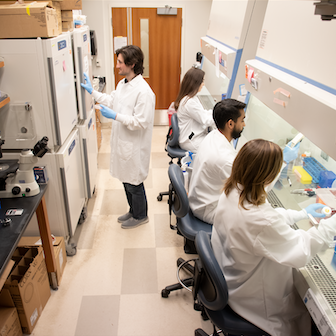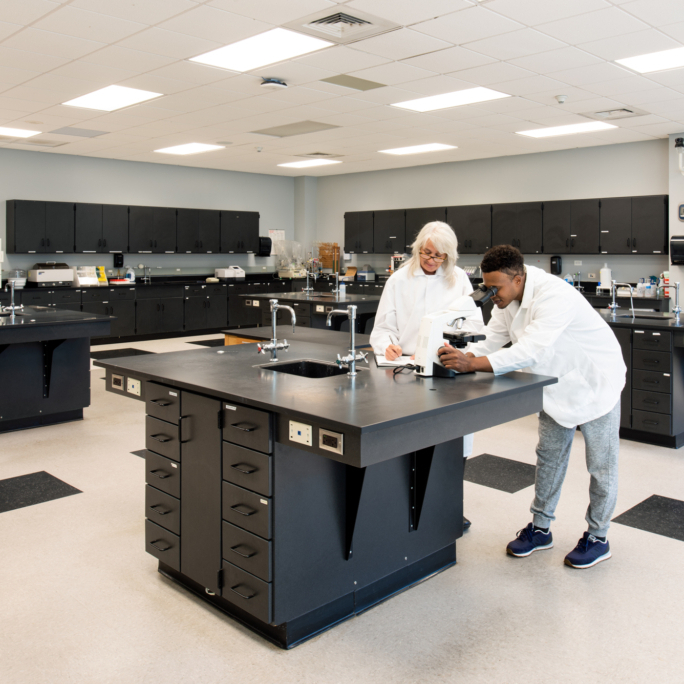Built to help you scale and get your therapies to market quickly.
With three top-tier research institutions, nationally acclaimed hospitals, and a highly educated workforce, the Research Triangle Region has everything you need - from conception to commercialization - to bring your gene & cell therapies to market.
Our region's growth and success are reflective of the many factors that have made us a beacon for the life sciences. After all, the University of North Carolina at Chapel Hill (UNC) is one of the original birthplaces of gene therapy research and home to the UNC School of Medicine Gene Therapy Center, founded in 1993 by R. Jude Samulski, PhD, a pioneer in the field. From industry-driven training programs to funding opportunities and physical infrastructure, we can support continued growth and collaboration in this highly specialized industry in a region that is a nationally-ranked place to live and work.
NC Biotech is a non-profit dedicated to helping life science companies bring their ideas to market.
Gene Therapy at a Glance
The Largest Life Science Hub in the South
More than 600 life science companies operate in the Research Triangle Region, ranging from fast growing start-ups and massive multi-national corporations. Some are focused solely on research, while others specialize in manufacturing drug therapies at a scale that can't be replicated anywhere in the world.
More than 24,000 people are directly employed in this industry, where the average annual wage is $142,900. The sector contributes almost $10 billion to the regional economy and accounts for 2.5% of area's employment.
The Research Triangle Region is known as the birthplace of Contract Research Organizations (CROs) with the formation of IQVIA (formerly Quintiles) in the Triangle Region. Today, seven of the top 10 global CROs operate in the Research Triangle Region - IQVIA, Syneos Health, Parexel, PRA Health Sciences, PPD, Charles River Laboratories International and Icon Public Limited Corp. Not to mention, seven CROs are headquartered here including IQVIA, RTI International, Syneos Health, Duke Clinical Research Institute, PRA Health Sciences, FHI 360 and Rho.

Gene Therapy Companies Located in the Triangle
Company Highlights

Asklepios BioPharmaceutical (AskBio)
AskBio is a homegrown gene therapy success story. Founded in 2001 by Dr. Samulski with co-founder Sheila Mikhail, AskBio is at the forefront of clinical-stage adeno-associated virus (AAV) gene therapy, technology that was developed at UNC's Gene Therapy Center. Headquartered in Research Triangle Park, the innovative company has a portfolio of clinical programs across a range of neurodegenerative and neuromuscular disorders.
In 2019 the company raised $235M to fuel the company's growth and advance their clinical trials, with private equity firms, TPG Capital and Vida Ventures investing a combined $225 million for a minority stake in the company and AskBio's founders and board members co-investing an additional $10 million.

StrideBio
Another leading developer of novel adeno-associated viral (AAV) based gene therapies, StrideBio is based in Research Triangle Park in a 24,000 sf facility housing their offices, research labs and AAV manufacturing facilities. This capability to manufacture their wholly owned proprietary cell-line in-house makes them unique in the gene therapy space and serves to highlight how the region is supportive of industry growth and expansion, in terms of workforce and physical space.
Co-founded in 2015 by leading scientists Mavis Agbandje-McKenna, Ph.D., and Aravind Asokan, Ph.D., Director of Gene Therapy at Duke University, StrideBio has a growing pipeline of therapeutic programs and has shown itself to be an innovator at the forefront of the industry.
We're built to help you scale.

Renowned Research Centers
The center that started it all for North Carolina, the Gene Therapy Center at the University of North Carolina School of Medicine, is an internationally renowned center that houses two specialized core facilities supporting preclinical and clinical gene therapy studies, with the mission of merging genetics and research with healthcare delivery.
At the intersection of biochemistry, virology, and genetics, also at UNC the Asokan Lab on Synthetic Virology and Gene Therapy focuses on building innovative technology platforms for gene therapy, gene regulation, and gene editing. This cross-disciplinary approach has yielded several gene therapy platforms currently being evaluated in preclinical and clinical studies.
The interdisciplinary Duke Center for Advanced Genomic Technologies spans both Duke University's Pratt School of Engineering and School of Medicine by bringing together engineers, scientists, and physicians in collaborative research efforts on the human genome, with a specific focus on decoding the dark genome.
Advanced Manufacturing
Manufacturing in North Carolina has come a long way from its roots in traditional manufacturing for the textile and furniture industries, expanding to advanced manufacturing fields like biotechnology, pharmaceutical, and aerospace. In the Research Triangle Region alone, there are 200 advanced manufacturing firms employing more than 12,500 people. The advanced manufacturing sector has enjoyed a 4.4% growth rate over the past year. This is more than six times the rate of growth in the United States as a whole.
Ranked #9 in the country for Manufacturing Employment* with a specialized workforce of 460,000, North Carolina is one of the few places in the country with the infrastructure to take your ideas from the lab to the manufacturing line, all from a single location.
*Business Facilities | July 2018


Support and Partnerships for Clinical Trials
North Carolina is the birthplace of clinical research organizations. With leading health systems and hospitals, North Carolina can support your clinical trial from design and implementation to analysis and regulatory submission. Here, you'll find the Durham VA Health Care System, WakeMed Health and Hospitals, and UNC Health and Duke Health - two leading medical teaching and research hospitals - that conduct roughly 85% of the clinical trials active in the region.
As of July 2019, there were 3,024 total clinical trials active in the Raleigh area.
Approximate attributable data as per the TrialScout database collapse as of 7/22/2019. All data is derived from https://clinicaltrials.gov.
Educational Programs
Part of the BioNetwork - the Life Science Training Initiative of the North Carolina Community College System - BioWork trains students for a career as a process technician for biotechnology, pharmaceutical and chemical manufacturing companies, as part of a 136-certificate program available at seven of our area's community colleges.
At North Carolina Central University, Biomanufacturing Research Institute and Technology Enterprise (BRITE) students follow curriculums developed in partnership with premier biotech companies and participate in hands-on research, earning a B.S. in Pharmaceutical Sciences, with a concentration in bioanalytical chemistry, protein separation sciences or molecular cloning.
The Biomanufacturing Training and Education Center (BTEC) at N.C. State offered the first graduate degree in biomanufacturing available in the country. This unique, cross-disciplinary center, funded by a grant from Golden LEAF and supported by $5.5M in annual state funding, provides hands-on training with the latest biomanufacturing technologies, minimizing training time and costs incurred by the industry.


FUJIFILM Diosynth Biotechnologies to double Holly Springs biomanufacturing campus; +$1.2B, +680 New Jobs

